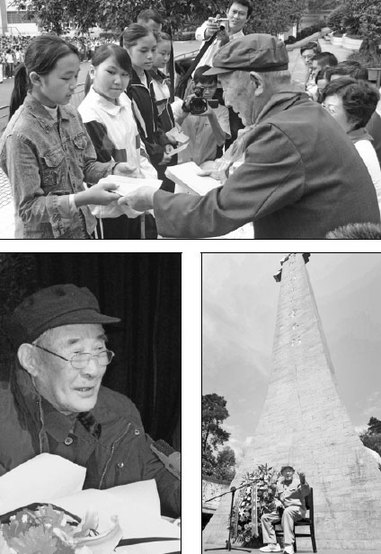Fighting spirit lives on in Long March veteran
It all started toward the end of 1994, when Li Guang accompanied a charity team to a primary school in Zunyi, Southwest China's Guizhou province.
As a Red Army veteran, he was angry to find that the school's playground didn't have a national flag. Li asked the headmaster: "How do you hold flag-raising ceremonies for the children?"
Furthermore, he noticed holes and cracks in the mud walls of a classroom. The children were without shoes and in thin clothing, exposed to the cold air from outside. They had wooden boards on stumps for desks and there were no chairs.
Li donated 400 yuan ($60), all the money in his wallet, to the school.
Back then, the average annual income of an employee in State-owned enterprises in Guizhou was a little more than 4,000 yuan.
After leaving the school, Li kept thinking of the children who reminded him of his own childhood.
Born in Zunyi in 1921, Li was orphaned at age 2. By the time he turned 8, his foster parents had left him.
He started herding cattle for landlords and often went hungry.
In January 1935, when a faction of the Red Army arrived in Zunyi after crossing the Wujiang River, as part of the Long March, Li waited for the Communist soldiers. In a bid to get people to vacate the now prefecture-level town, the nationalist Kuomintang forces spread the rumor that Red Army members "ate human flesh".
Li wanted to find out if the rumor was true.
Instead, he saw the Communist soldiers helping the elderly people, looking after the sick and giving their own rations to the area's starving people.
The Communist Party of China hosted one of its most important meetings in history in Zunyi on Jan 15, 1935, when New China's founding father Mao Zedong was elected leader of the CPC.
It was around the time that Li went to a Red Army soldier and volunteered to join them.
As a child he never had the chance to study and knew limited Chinese characters, which led to a mistake in a battle later.
As a battalion commander, Li received a written order from higher officers that he and his troops "should evacuate before daybreak".
He didn't understand the word "daybreak" and his assistant was not around to help. The next day, when Li gathered his army and decided to leave in broad daylight, it was too late. They were captured by the Kuomintang and a lot of people died.
Since then, he has always emphasized the importance of education.
Now 95, Li still recalls the hard years he spent with the Red Army in snowy mountains and marshy grasslands where they ate little food and wore handmade clothes.
"We spent five days walking along the Jinsha River to the Luding Bridge, eating only one meal. For that meal, before we cooked the food thoroughly, we needed to fight the enemy. So we put the food in our hats, running while eating the half-cooked food," he recalls.
He says many of his comrades lost their lives during the War of Resistance against Japanese Aggression from 1937 to 1945 and the three-year war of liberation.
"So many people died to build a better life for the generations to follow," Li says.
Li has been donating his pension to children from poor families so they may continue studying until university. Since 1995, he has donated more than 400,000 yuan to help more than 1,700 such children.
In 2000, Li was diagnosed with rectal cancer and survived a major surgery and follow-up treatment.
In 2002, he had acute pancreatitis that kept him in a coma for 20 days. Four years later, he was diagnosed with skin cancer, which took a few surgeries to control.
Despite his poor health, Li visits schools and armed forces institutes to tell young people about the struggles of the Long March, asking them to cherish life and the chance to get educated.
"I was born in the age of war, without a chance to study. Today, I feel sorry if some children cannot go to school because their families are poor. I've been a CPC member for 77 years, and helping such kids is my responsibility."
yangyangs@chinadaily.com.cn
|
Red Army veteran Li Guang visits schools and gives lectures to tell young people his stories of the Long March. Photos Provided To China Daily |



















